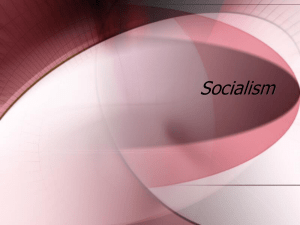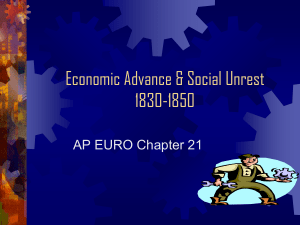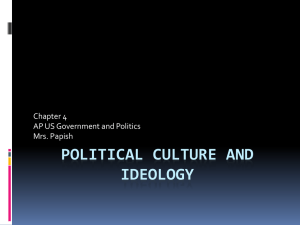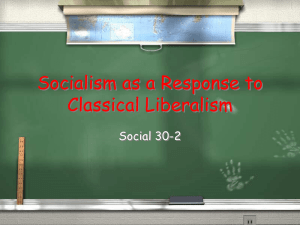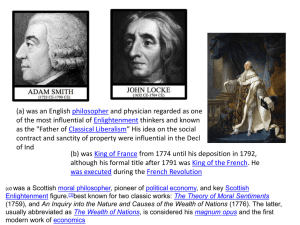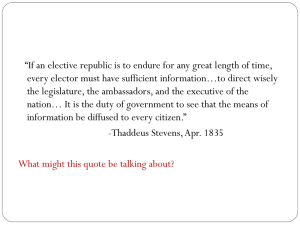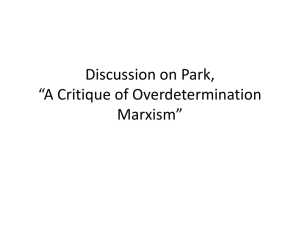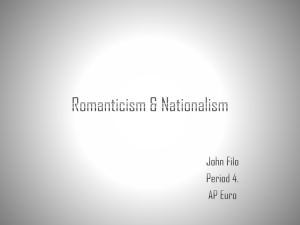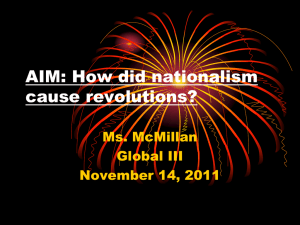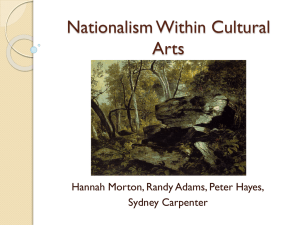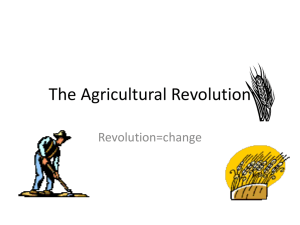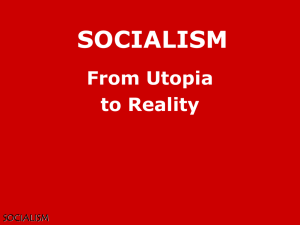Utopian Socialism
advertisement
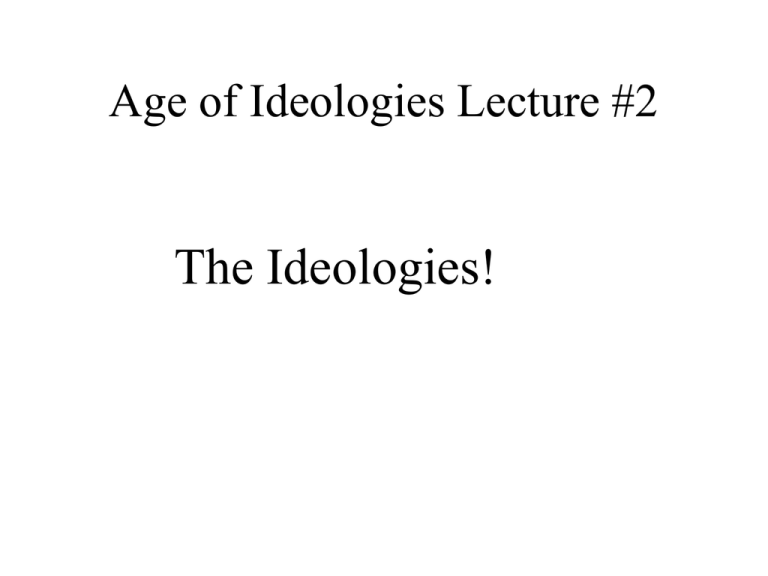
Age of Ideologies Lecture #2 The Ideologies! Was the Congress of Vienna Successful? Water = Traditional Conservative Europe Metaphor Time Fire = Liberal Enlightenment Ideas Rolling BoilNapoleonic WarsBring Rev. to the Rest of Europe First BubblesFrench Revolution Was the Congress of Vienna Successful? Holy Alliance Congress of Vienna Censorship, etc Carlsbad Decrees French Revolution Holy Alliance Congress of Vienna Censorship, etc Industrial Carlsbad Revolution Decrees An Explosion of Ideologies •Liberals, aka Classical Liberals, still existed after the French Revolution •Classical Liberals v Modern Liberals •Their basic tenets are basically unchanged •Liberty – representative gov’t, checks on power, etc. •Equality- no class system or legal discrimination •However, these ideas lost their appeal for many. Why? •Didn’t go far enough •Failed in French Revolution •Classical Liberals want economic liberalism/free market capitalism. In the new industrial age, this helps the bourgeoisie but not the working class. •Ricardo, Malthus, and Smith are used by the bourgeoisie as justifications of self-interested policies •Classical Liberalism is tied to the moderate middle class •Many desire more radical reform The Central Ideologies of the Age • • • • Utopian Socialism Scientific Socialism ‘Old-style’ Nationalism Romanticism Utopian Socialism • “The future, with industrial advancement will be perfect!” • However, many thinkers rejected Utopian Socialism because it was impractical – The utopian socialists never got anything done! Marxian, or ‘Scientific’ Socialism • Marx saw that early (Utopian) Socialism was too ‘fanciful’ – not firmly grounded in theory or reality – begged the bourgeoisie for concessions they would never grant • Inspired by (and teamed up with) Friedrich Engels (The Condition of the Working Class in England) • Wrote the Communist Manifesto – Argued for a ‘scientific’ form of Socialism Marx’s Basic Points • history is the story of class struggle – bourgeoisie had recently replaced the feudal nobility • Political and economic systems protect the class in power – Conservatism protected the aristocracy – Capitalism and Liberalism protect bourgeois • exploitation of the proletariat + class consciousness = VIOLENT revolution – Why was class consciousness already growing? • Believed that labor was the source of all economic value but that private property allowed capitalists to steal this value from workers • After proletarian revolution, abolish private property… end of historical class struggle Marxian Socialism – A More Complicated Look • Idea of history as a dialectical process from German philosopher Hegel – Dialectic process means all of history was constant tension leading to constant, predictable, change • Hegel argued that there was always a dominant societal model and an alternative model – The two fought it out until a new synthesis was formed and the whole process repeated. • Marx added an engine to this dialectic: economics – Abolish private property and you end the dialectical Marx’s Impact • Secular religion – included all of the dominant strains of thought of the time period: German philosophy, Utopian Socialism, and Classical Economics (Capitalism) • it replaced religion – ‘opiate of the masses’ • Little noticed at first, but will become HUGE! Marxian Socialism Is Highly Radical • Fills Conservatives and even Classical Liberals with special dread. Why? • “Let the Ruling Classes Tremble at a Communist revolution. The Proletariat have nothing to lose but their chains. They have a world to win. WORKING MEN OF ALL COUNTRIES, UNITE!” Nationalism • After 1st Hundred Years War- France and England • after 2nd HYW- rest of Europe – Why? Largely a reaction against the French dominance of the continent of Europe. “I don’t know who ‘we’ are, but I know we aren’t ‘them’! • Definition hope to turn ethnic boundaries (defined especially by language) into political boundaries • Most early nationalists were liberals or moderate socialists. Why does this make sense? – Liberalism- freedom and equality of an individual – Nationalism is the freedom and equality of a people…each people must be able to make their pure voice heard • Why few conservative nationalists? – Conservative monarchs rule over empires– if these people get nationalist ideas, then you’ve got some problems Nationalism (cont.) • Nationalism’s Dark Underbelly – If we are prideful in our ethnicity, then … ??? – Later, we will be introduced to conservative nationalists and the #$!@ will hit the fan – National Socialism Nazism equality of condition, but only for our people Romanticism “the spontaneous overflow of powerful feeling recollected in tranquility” • German and English, which means it is religiously attached to … • Sturm and Drang Movement • • • • • • • • • Born out of Rousseau • Ludwig van Beethoven Johann Wolfgang Goethe • Liszt Francisco Goya • Richard Wagner William Wordsworth Lord Byron Mary Shelley Victor Hugo Alexander Pushkin Washington Irving Characteristics • • • • • • • • Emotion Spontaneity Love of nature Desire to know the unknowable Fascinated with the bizarre and exotic Anti-materialist Intensely individualist ‘bohemian’ A Break With Classicism • Rejects Industrialization Beethoven’s Ode to Joy Closely connected to Nationalism • Why? – Because Romanticism argues for intense individualism – Nationalism is like individualism of a collective group (nationality/culture) – the unique essence of each culture • Europe as a ‘concert’ where each culture must play their instrument • Brother’s Grimm and other folktales Possibly Wagner- Flight of the Valkeryies Here Hansen Name ____________________ AP Euro Period _________ The Age of Ideologies Lecture #2 ‘ The Ideologies’ Note-Taking Guide) • An Explosion of Ideologies – Liberals, aka Classical Liberals, still existed after the French Revolution • Classical Liberals v Moderate Liberals _____ _____________________________________ _____________________________________ _____________________________________ – Their basic tenets are basically unchanged • Liberty – ______________________________________ • Equality- ______________________________________ – However, these ideas lost their appeal for many. Why? • ___________________________________ • ___________________________________ • Classical Liberals want __________________________ _______________________ . In the new industrial age, this helps the bourgeoisie but not the working class. – Ricardo, Malthus, and Smith are used by the bourgeoisie as justifications of self-interested policies • Classical Liberalism is tied to the moderate middle class • The Central Ideologies of the Age – ______________________ - ________________________ – ______________________ - ________________________ Utopian Socialism – “The future, with industrial advancement __________!” – However, many thinkers rejected Utopian Socialism because it was _____________ • The utopian socialists never _________________! Marxian, or ‘Scientific’, Socialism – Marx saw that early (Utopian) Socialism was too ‘fanciful’ • ____________________________________________ • begged the bourgeoisie for concessions ______________ __________________________ – Inspired by (and teamed up with) _______________ (The Condition of the Working Class in England) – Wrote _____________________________________ • Argued for a _______________________________ – • • ______________________________ – – Marx’s Basic Points • history is the story of __________________ – _____________________________________ _____________________________________ • Political and economic systems ____________________ – Conservatism protected the ___________ • Capitalism and Liberalism _________________ – exploitation of the proletariat + class consciousness = __________________________ – Why was class consciousness already growing? ______________________________________ ______________________________________ • Believed that _________________________________ but that private property allowed capitalists to steal this value from workers • After proletarian revolution, ______________________ … end of historical class struggle Marxian Socialism- a More Complicated Look • Idea of history as a ___________________ from German philosopher Hegel – Dialectic process means all of history was _______________________________________ _______________________________________ • Hegel argued that there was always a dominant societal model and an alternative model – ______________________________________ ______________________________________ • Marx added an engine to this dialectic: ___________ – Abolish private property and you __________ _____________________________________ – – • Marx’s Impact • _____________________ – included all of the dominant strains of thought of the time period: German philosophy, Utopian Socialism, and Classical Economics (Capitalism) • it replaced religion – ‘opiate of the masses’ - ___________________ _______________________________________ • Little noticed at first, but will _________________! Marxian Socialism is __________________ • Fills Conservatives and even Classical Liberals with special dread. Why? • “Let the Ruling Classes Tremble at a Communist revolution. The Proletariat have nothing to lose but their chains. They have a world to win. WORKING MEN OF ALL COUNTRIES, UNITE!” • In other words __________________________________ _____________________________________________ Nationalism – – – – – – After 1st Hundred Years War- France and England after 2nd HYW- ______________________ • Why? Largely a reaction against the _______________ _______________________________. “I don’t know who ______ are, but I know we aren’t __________! Definition hope to turn ___________________ (defined ______________________________) into political boundaries Most early nationalists were liberals or moderate socialists. Why does this make sense? • Liberalism- freedom and equality of an individual • Nationalism is the freedom and equality ____________ ______________________ people must be able to make their ______________________________ Why few conservative nationalists? • Conservative monarchs rule over empires– if these people ________________________________________ ______________________________________________ Nationalism’s ___________________ • • • If we are prideful in our ethnicity, then … ??? Later, we will be introduced to conservative nationalists and the ________________________________ National Socialism Nazism __________________ ___________________________________ • Romanticism – “the spontaneous overflow of powerful feeling recollected in tranquility” – German and English, which means it is religiously attached to _________________________ – Sturm and Drang Movement- __________________________ – Characteristics – Emotion, Spontaneity, Love of nature, Desire to know the unknowable, Fascinated with the _____________, ________________, _________________, ‘bohemian’ – A break with Classicism • Rejects Industrialization – Closely Connected to Nationalism • Why? – Because Romanticism argues for intense individualism – Nationalism is like ______________________ _____________________________________ – the unique essence of each culture » Europe as a ‘concert’ where _______ ______________________________ » Brother’s Grimm and other folktales _______________________________ _______________________________
